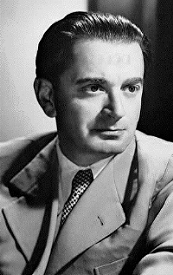 The composer Miklós Rózsa was born in Budapest on April 18, 1907. At the age of 5 he started taking violin lessons, reading music before he could read words. At 7 he composed a student march. In 1929, the year he graduated from the Leipzig Conservatory, his String Trio, Op. 1, was published. In 1933 he composed Theme, Variations and Finale, Op. 13, which brought him his first international recognition. In 1935 Rózsa received an invitation from the Hungarian Legation in London to come to England and compose the music for a ballet. He fortified himself with three lessons in English and caught the next boat. The composer loved London and decided to live there after his ballet, Hungaria, written for the company of Alicia Markova and Anton Dolin, was very well received.
The composer Miklós Rózsa was born in Budapest on April 18, 1907. At the age of 5 he started taking violin lessons, reading music before he could read words. At 7 he composed a student march. In 1929, the year he graduated from the Leipzig Conservatory, his String Trio, Op. 1, was published. In 1933 he composed Theme, Variations and Finale, Op. 13, which brought him his first international recognition. In 1935 Rózsa received an invitation from the Hungarian Legation in London to come to England and compose the music for a ballet. He fortified himself with three lessons in English and caught the next boat. The composer loved London and decided to live there after his ballet, Hungaria, written for the company of Alicia Markova and Anton Dolin, was very well received.
After seeing Hungaria, the French-Belgian film director Jacques Feyder asked Rózsa to write the music for a film he was going to direct in London for Alexander Korda. Feyder took the composer to see Korda and talked the esteemed Hungarian producer into letting him score Knight Without Armor (1937), starring Marlene Dietrich and Robert Donat. Shortly after, Rózsa composed scores for The Four Feathers (1938), The Spy in Black (1939), On the Night of the Fire (1939)--though all three had lengthy sequences absent of music--and the masterpiece of his early period, Korda's The Thief of Bagdad (1939). In London Rózsa also wrote his Three Hungarian Sketches, Op. 14, an exceptionally well-received work introduced in 1938 at the International Music Festival in Baden-Baden.
The Korda films assured the success of Rózsa as a film composer and he made the move to Hollywood in 1940. There his vein of exotic fantasy was once again mined in The Jungle Book (1942). Lydia and Lady Hamilton (both 1941) have a youthful exuberance which largely disappeared as his music grew older, stronger, and more individual. By the time of the two Billy Wilder classics--Double Indemnity (1944) and The Lost Weekend (1945)--a new maturity was in focus. Rózsa's work in film noir and "psychological melodrama" at the time was innovative for his use of the theremin, first heard on a motion-picture soundtrack in his score for Alfred Hitchcock's Spellbound (1945).
It was a natural transition from such films to the gangster melodramas which dominated Rózsa's career in the late forties, several of them classics of the film noir genre. The Killers (1946) was one of a trilogy of underworld dramas produced by Mark Hellinger for which his friend Rózsa wrote the music, the other two being Brute Force (1947) and The Naked City (1948). Rózsa's last film in this genre was John Huston's The Asphalt Jungle (1950), which delt with the planning, execution and retribution of a million-dollar jewel store robbery, but struck a more coolly realistic, less histrionic tone than most of its predecessors.
Rózsa's move to MGM in 1949 inaugurated a new era in his film music. From then on he was mostly associated with large, historical epics. He wrote Knights of the Round Table (1954) in six weeks, penned Lust for Life (1956), the Van Gogh biopic based on the novel by Irving Stone and starring Kirk Douglas as the great painter, and won his third Academy award for William Wyler's Ben-Hur (1959). His other epic scores include Quo Vadis (1951), Julius Caesar (1953), King of Kings (1961), El Cid (1962), and Sodom and Gomorrah (1964).
In America since 1940, Rózsa divided his time between the composition of concert music, writing for films and teaching (he was appointed Professor of Composition at the University of Southern California in 1945 and taught a course in film composing until 1970). Among his works composed in America were such significant and widely performed scores as the Concerto for String Orchestra, Op. 17 (1943); the Violin Concerto, Op. 24 (1955)--written for Jascha Heifetz; and the large-scale orchestral work, Tripartita, Op. 33 (1972). Rózsa was the recipient of three Academy Awards for his film scores: Spellbound, A Double Life (1947), and Ben-Hur.
Seemingly forgotten by a pop-oriented Hollywood in the 1970s, Rózsa experienced an extraordinary renaissance in later years. His film scores were rediscovered and successfully recorded by Charles Gerhardt, Elmer Bernstein, and Rózsa himself. Young filmmakers now sought his contribution as a privileged connection with a legendary Hollywood past: Larry Cohen in The Private Files of J. Edgar Hoover (1977), Jonathan Demme in The Last Embrace (1979), Nicholas Meyer in Time After Time (1979), and even the comedy of Carl Reiner in Dead Men Don't Wear Plaid (1982). Rózsa summed up his career with an elegant memoir, Double Life, published in 1982. That same year, a debilitating stroke began the final chapter. His final years were severely restricted in their activity, but increasingly rewarded by the admiration of fans the world over. Rózsa died on July 27, 1995.
--CHRISTOPHER PALMER, from
The Composer in Hollywood.